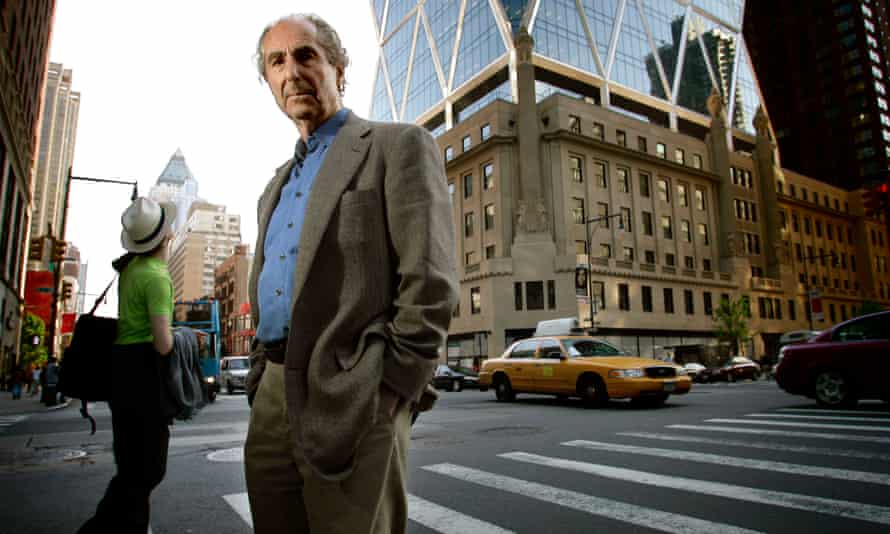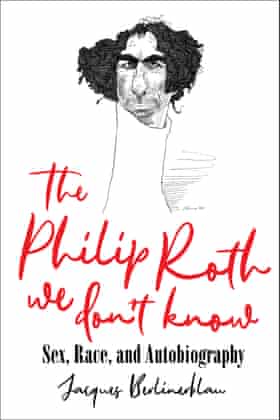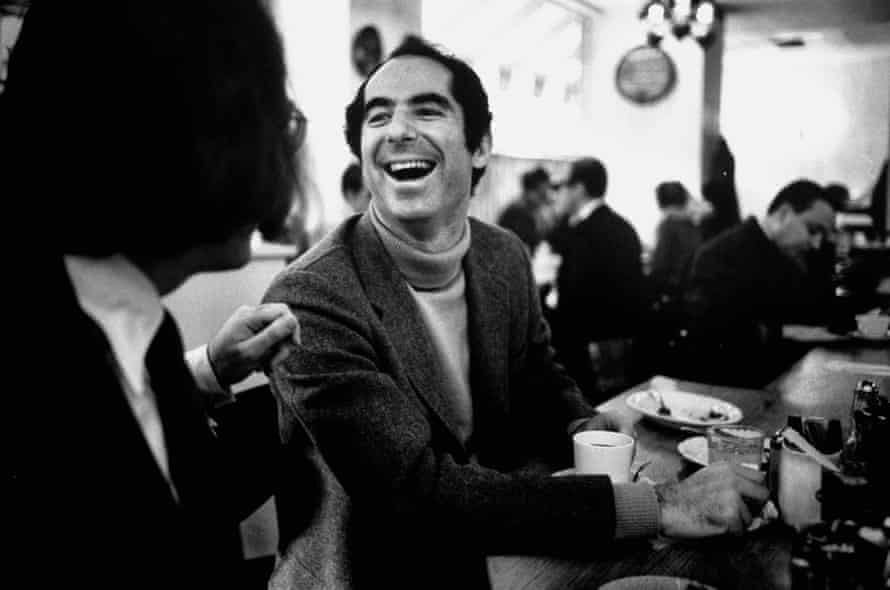Read this if you want to - all of it >
A master of self-promotion: letters reveal how Philip Roth ‘hustled’ for prizes
Correspondence found in archives shows how ‘pushy’ novelist used ‘collusion, networking and back-scratching’ to win literary awards

Insert
As one of America’s foremost novelists, Philip Roth was awarded nearly every literary accolade, including a Pulitzer prize. It might be assumed that his work spoke for itself in securing these plaudits, but previously unpublished letters reveal he was, in fact, a master of self-promotion, networking and mutual back-scratching.
Professor Jacques Berlinerblau, who studied the correspondence while writing a book about Roth, was surprised by how pushy the author was and by his wheeler-dealing with friends and colleagues from the worlds of publishing, literary criticism and academia. “It’s something one would never get from reading his highly autobiographical descriptions of the writer’s lonely life,” he said.
Roth died in 2018 aged 85. His novels included The Ghost Writer, which introduced his alter ego, a young writer named Nathan Zuckerman, who also narrated the Pulitzer prize-winning American Pastoral.
The extent of Roth’s networking has emerged from dozens of letters held within the archives of the Library of Congress in Washington.

Berlinerblau, of Georgetown University, Washington, who has published papers on Roth and lectured on his work for three decades, said: “The thing I learnt about Roth in looking through this material is how much time he spent networking, scratching people’s backs, placing his people in positions, voting for them. There are countless examples of friends in publishing and the literary worlds doing favours for Roth – some of those including awards committees. There is ample reason to infer from their responses that Roth reciprocated.
“So much of Roth’s fiction – about a writer who resembled Roth – neglected to allude to that component of the artist’s life. It was a bit disillusioning for me, as I thought – naively – that the great writer cared only for art, its integrity, its austere demands.
“We have this romantic conception of the great man, who’s just lost in the endeavour, and Roth writes about this in The Ghost Writer, probably his best novel. He wants to be passionately writing – art, art, art, nothing but art, life will not intrude on art. It was a vision of Roth that Roth sold.”
The writer went to huge lengths to shape his posthumous reputation, giving his authorised biographer, Blake Bailey, exclusive access to a treasure trove of archival material. Shortly after the biography was published earlier this year, several women accused Bailey of sexual misconduct and assault (allegations he has denied), leading his US publisher to pulp the book, although it was later taken on by another publisher.

Berlinerblau notes that, in a 2012 interview, Roth mentioned asking his executors to destroy material after his death: “The prevailing story … was that Roth tried to control his legacy from the grave. In researching this book, it became clear to me that Roth did this during his life as well. He ‘hustled’. He spent a lot of time advancing his career.”
Berlinerblau acknowledged that all writers self-promote and that a young Roth was known to have pushed hard to publish his 1959 fiction collection, Goodbye, Columbus. But he added: “Roth was the beneficiary of relationships, arrangements and perks that few writers ever possessed.”
The letters reveal “the degree of collusion”, he said, singling out one in which Roth told a scholar, who had written glowingly about him, that he had tried to get him a particular academic job.
Berlinerblau also pointed to an extensive correspondence with a literary critic, which includes discussions about literature: “But mostly they’re talking about how they can help each other with this award, this position… It made me a little suspicious about the publishing world. There’s a lot of networking.”
In one letter, that critic – a close friend – congratulated Roth on receiving a prestigious literary prize, when he had actually headed the committee making the decision. Roth, in turn, helped him. The critic wrote to Roth: “I am also applying for another fellowship… So, may I ask you to dust off the letter you recently sent and send a version of it again.”
Correspondence with Ted Solotaroff, the late publisher, editor and reviewer who had written in praise of his friend Roth’s writings over the years, reveals he had asked the writer to support a grant application. Roth did so, writing that Solotaroff is “one of the very best literary critics”, repeating the favour for Solotaroff’s nomination for a grant and his application for an academic residency.
Berlinerblau was “shocked” to see such obvious back-scratching: “I’m a liberal academic, who believes in critical distance and blind peer review.”
He added: “I can’t think of a single novel where you had an alter ego Zuckerman who writes a letter on behalf of someone else, and his friend sends him a letter saying I got you the prize, baby, I talked you up, you’re in…
“He refrained from depicting that ‘hustling’ aspect of the craft, even though so many of his novels were about writers just like him.”
Berlinerblau studied the correspondence in writing his forthcoming book, The Philip Roth We Don’t Know: Sex, Race and Autobiography, to be published by the University of Virginia Press in September.
Ultimately, Berlinerblau said, it is all the more surprising because Roth was such “a magnificent writer”.
Another leading scholar, Ira Nadel, author of Philip Roth: A Counterlife, said: “It’s absolutely true. He was a great self-promoter from the beginning. I’m not sure he didn’t need to do it. He played the game, the game of publishing. He knew self-promotion was the key to keeping your name out there and getting your books both published and sold.”

No comments:
Post a Comment